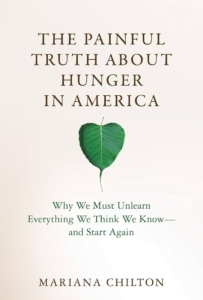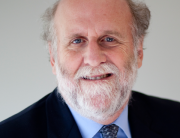Hunger is far more than the immediate and tangible experience of not being able to find or buy food. While it is true that hunger is often depicted as the physical sensation of an empty stomach—a condition that can be temporarily alleviated by food—the issue runs much deeper. Hunger is more than the absence of food; it is a manifestation of deeper, societal and structural failings leading to individual and collective trauma. To genuinely combat hunger, we must engage with its underlying causes—economic inequality, systemic discrimination, and societal neglect—and strive to create a compassionate and just society where all people have the resources, respect, and opportunities they need to thrive. In her book “The Painful Truth about Hunger in America: Why We Must Unlearn Everything We Think We Know—and Start Again” professor Mariana Chilton presents a bold, transformative perspective on addressing hunger and poverty in the United States. The book emphasises that hunger in the United States is underpinned by profound societal and structural failures that perpetuate poverty and ensure that millions remain trapped in cycles of scarcity. In this episode of Bridging the Gaps I speak with professor Mariana Chilton.
Although the book focuses on the issues of hunger and poverty in the United States, the human experiences and the underlying structural and social root causes it explores are often universal. The insights and key points raised in the book resonate with similar challenges faced in other societies and regions, making its research and findings valuable for broader learning and application.
Mariana Chilton is a Professor of Health Management and Policy at Drexel University’s Dornsife School of Public Health. She is the founder of the Center for Hunger-Free Communities, where she initiated impactful programs such as “Witnesses to Hunger”, aimed at amplifying women’s voices in the national conversation on hunger and poverty, and the “Building Wealth and Health Network”, which focuses on fostering economic security and healing. Chilton has provided expert testimony on hunger solutions before both the US Senate and the House of Representatives.
Our discussion delves into the intricate connections between hunger and trauma, revealing the emotional and psychological toll on individuals and communities. We examine the persistent nature of poverty and its link to generational trauma and explore the complex relationship between poverty, violence, and systemic inequalities. Professor Chilton provides thoughtful explanations supported by real-world examples and personal stories, many of which are detailed in her book. We also discuss challenges involved in conducting research on such sensitive topics, particularly when working with vulnerable populations. The discussion covers both ethical considerations and the logistical obstacles researchers face when collecting data and sharing findings in a manner that respects and empowers participants. Professor Chilton’s insights shed light on the importance of compassionate, inclusive approaches to research and advocacy that prioritise the voices of those most affected by these issues.
Complement this discussion with “The Blind Spot: Why Science Cannot Ignore Human Experience” with Professor Adam Frank and then listen to “A Passion for Ignorance” and for Denials and Negations with Professor Renata Salecl.







Connect With Us